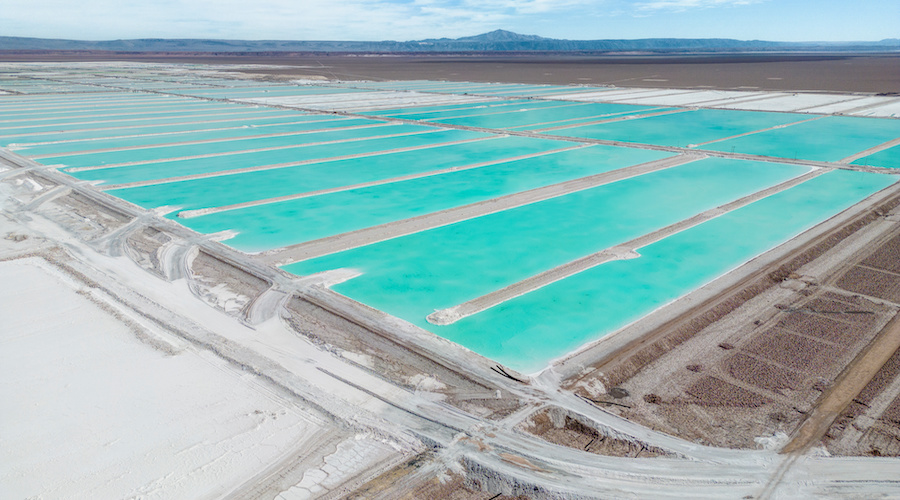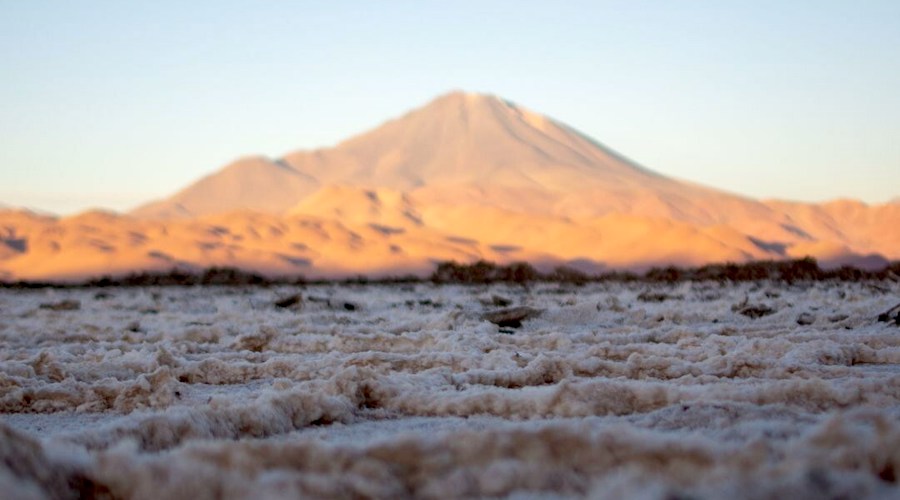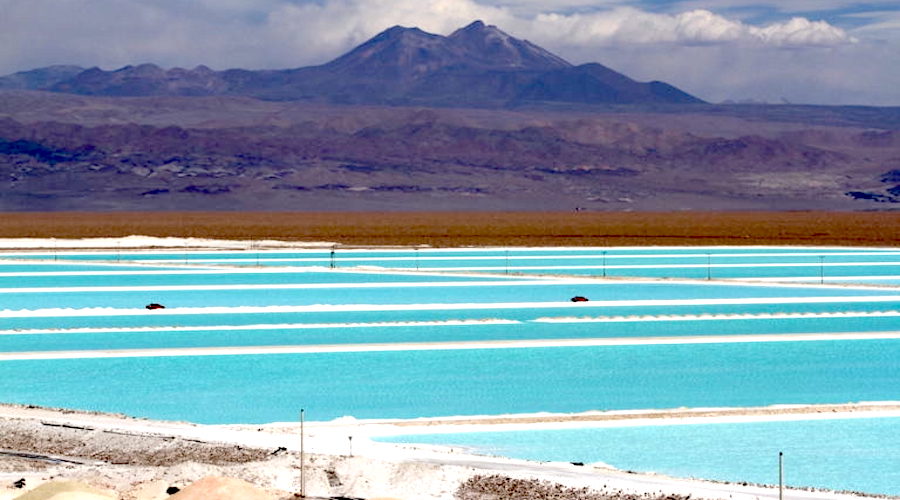Summit Nanotech eyes $150m to scale up lithium extraction method
Cecilia Jamasmie | September 7, 2023

Evaporation ponds in northern Chile. (Image by: freedom_wanted | AdobeStock.)
Canada’s Summit Nanotech plans to raise $150 million to take its own direct lithium technology to commercial scale as the startup gears to open a testing facility in Santiago, Chile before year-end.

“We’re already engaging investors and we’re building the data room,” chief executive Amanda Hall told Bloomberg this week on the sidelines of an industry event in Chile.
Her expectation is that the second round of funding will reflect a valuation of $400 million to $600 million.
The Calgary-based firm is one of several currently racing to commercialize technology to extract lithium directly from brines. These methods would offer an alternative to hard rock and giant water-intensive evaporation ponds that currently supply the battery metal to the world.
The new set of technologies, known as direct lithium extraction, or DLE, could lower the costs, reduce time and minimize the environmental impact of extracting the battery metal, particularly in South America, which holds about half of the world’s reserves.
DLE could also enable new sources of lithium in North America, such as extracting it from the saline water generated by oil drilling.
Summit Nanotech, which already counts BHP as an investor, said it is gearing up to kick off activities at a new testing facility this week and expects to have a demonstration plant in the field by mid-2024. The goal, Hall explained, is to reach commercial scale by the end of 2025
Cecilia Jamasmie | September 7, 2023

Evaporation ponds in northern Chile. (Image by: freedom_wanted | AdobeStock.)
Canada’s Summit Nanotech plans to raise $150 million to take its own direct lithium technology to commercial scale as the startup gears to open a testing facility in Santiago, Chile before year-end.

“We’re already engaging investors and we’re building the data room,” chief executive Amanda Hall told Bloomberg this week on the sidelines of an industry event in Chile.
Her expectation is that the second round of funding will reflect a valuation of $400 million to $600 million.
The Calgary-based firm is one of several currently racing to commercialize technology to extract lithium directly from brines. These methods would offer an alternative to hard rock and giant water-intensive evaporation ponds that currently supply the battery metal to the world.
The new set of technologies, known as direct lithium extraction, or DLE, could lower the costs, reduce time and minimize the environmental impact of extracting the battery metal, particularly in South America, which holds about half of the world’s reserves.
DLE could also enable new sources of lithium in North America, such as extracting it from the saline water generated by oil drilling.
Summit Nanotech, which already counts BHP as an investor, said it is gearing up to kick off activities at a new testing facility this week and expects to have a demonstration plant in the field by mid-2024. The goal, Hall explained, is to reach commercial scale by the end of 2025
.

Summit Nanotech’s denaLi was chosen in August for Salar de Incahuasi asset in Argentina. (Image courtesy of CNW Group/Summit Nanotech.)
The privately-owned company’s DLE technology, dubbed denaLi DLE, allows miners to recover significant amounts of water otherwise wasted with traditional methods.
The small amount of water used is re-purposed and recycled back to the beginning of the process for pre-treatment and filtration, the company says.
It would also help shortening lithium production times from 18 months to just one day, according to Summit Nanotech.
Billions of dollars are pouring into DLE – what Goldman Sachs Group calls a “potential game-changing technology”, and which has been compared to what shale did for the oil market.
Some industry experts warn that despite a boom in testing and development, these techniques are relatively unproven at scale and perfecting them may take years.
The privately-owned company’s DLE technology, dubbed denaLi DLE, allows miners to recover significant amounts of water otherwise wasted with traditional methods.
The small amount of water used is re-purposed and recycled back to the beginning of the process for pre-treatment and filtration, the company says.
It would also help shortening lithium production times from 18 months to just one day, according to Summit Nanotech.
Billions of dollars are pouring into DLE – what Goldman Sachs Group calls a “potential game-changing technology”, and which has been compared to what shale did for the oil market.
Some industry experts warn that despite a boom in testing and development, these techniques are relatively unproven at scale and perfecting them may take years.
SQM’s Salar de Atacama operations become IRMA certified
Reuters | September 6, 2023 |

Brines in the middle of Chile’s Salar de Atacama contain the world’s highest known concentrations of lithium and potassium.
(Image courtesy of SQM.)
Lithium producer SQM’s operations in the Salar de Atacama salt flat have achieved IRMA certification, it said on Wednesday, meaning all Chile’s lithium mining facilities have now completed the evaluation process preferred by numerous EV manufacturers.

IRMA measures the environmental and social performance of mine sites under the rigorous standards set by the Initiative for Responsible Mining Assurance.

SQM scored 75 out of a possible 100 on its scale, receiving low marks from IRMA for its security arrangements and emergency preparedness, but high marks for its respect for biodiversity, fair labor standards and noise mitigation.
Its rival Albemarle was IRMA certified earlier this year, receiving an overall lower ranking of 50 due to low marks for community health and safety but high marks for greenhouse gas emissions abatement, among other factors.
SQM CEO Ricardo Ramos said in a statement the company’s decision to share the results of the audit “reflects our desire to improve and have an open dialogue with all affected stakeholders”.
IRMA provides third-party verification and certification of mining practices to protect human rights, communities and the environment along the supply chain. Ford and BMW are some of the companies which have joined the initiative.
(By Ernest Scheyder and Natalia Siniawski; Editing by Jan Harvey)
Lithium producer SQM’s operations in the Salar de Atacama salt flat have achieved IRMA certification, it said on Wednesday, meaning all Chile’s lithium mining facilities have now completed the evaluation process preferred by numerous EV manufacturers.

IRMA measures the environmental and social performance of mine sites under the rigorous standards set by the Initiative for Responsible Mining Assurance.

SQM scored 75 out of a possible 100 on its scale, receiving low marks from IRMA for its security arrangements and emergency preparedness, but high marks for its respect for biodiversity, fair labor standards and noise mitigation.
Its rival Albemarle was IRMA certified earlier this year, receiving an overall lower ranking of 50 due to low marks for community health and safety but high marks for greenhouse gas emissions abatement, among other factors.
SQM CEO Ricardo Ramos said in a statement the company’s decision to share the results of the audit “reflects our desire to improve and have an open dialogue with all affected stakeholders”.
IRMA provides third-party verification and certification of mining practices to protect human rights, communities and the environment along the supply chain. Ford and BMW are some of the companies which have joined the initiative.
(By Ernest Scheyder and Natalia Siniawski; Editing by Jan Harvey)
No comments:
Post a Comment